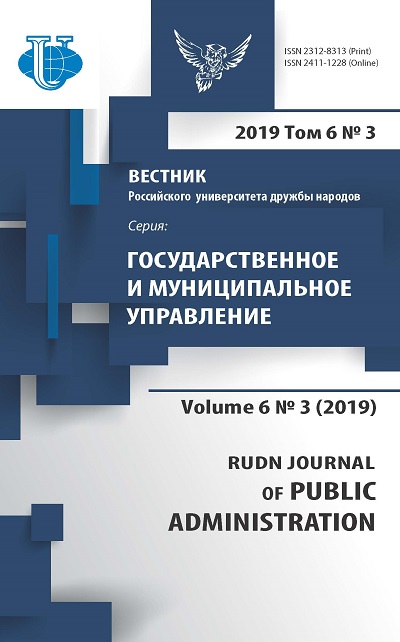Vol 6, No 3 (2019)
- Year: 2019
- Articles: 7
- URL: https://journals.rudn.ru/public-administration/issue/view/1310
- DOI: https://doi.org/10.22363/2312-8313-2019-6-3
Full Issue
Public administration: theory and practice
«Soft power» as a catalysator of socio-political conflicts
Abstract
The article is devoted to the study of a set of technologies united by the term “soft power” from the standpoint of using the potential of these technologies in order to manage socio-political conflicts in target countries. The essence and purpose of “soft power” in the contemporary activities of international political actors is revealed and investigated, and practical experience is used to study the key tools of “soft power”, including as an instrument of influence and propaganda in the global information space. The author makes a reasoned attempt to prove that in the era of globalization the importance and influence of “soft power” increases compared to traditional “hard” tools of influence, that “soft power” is actively used as a theoretical and practical guide at the global geopolitical level. The positive and negative potential of “soft power” are critically evaluated, the basic methods of protection against its destructive influence are analyzed.
 167-176
167-176


FINANCIAL AND ECONOMICAL ASPECTS OF PUBLIC ADMINISTRATION
The state and the “rentier economy” in oil exporting countries
Abstract
In the new foreign economic conditions that have arisen as a result of a significant deformation of the cyclical dynamics of the world oil market, the views on the model of the socalled “rentier state” and “rentier economy” that apply to oil exporting countries in Asia, Africa, Latin America, and also to the states of the post-Soviet space, including the Russian Federation, Kazakhstan, Azerbaijan and Turkmenistan, are of certain interest. For these states, in the face of declining oil export revenues, the question of changing the “rentier model” of development is relevant. At the same time, the recommendations of foreign authors are not acceptable in many aspects, but their analysis allows us to approach problems of overcoming the “raw nature” of the economy more comprehensively.
 177-192
177-192


FOREIGN EXPERIENCE OF PUBLIC ADMINISTRATION
Study on the effectiveness of internal control systems in Ghana public sector: a look into the district assemblies. Part 1
Abstract
 193-212
193-212


The role of african court on human and peoples’ rights protection: the case of libyan crises
Abstract
 213-222
213-222


CURRENT PROBLEMS OF PUBLIC ADMINISTRATION
Prospects for socio-economic development of the urban system
Abstract
The article presents an analysis of the socio-economic development of the city as a system. The main problems faced by Russian cities in the course of their development and ways to solve them have been revealed. The experience of socio-economic development of foreign cities was presented as an example, and the most effective methods were identified. On the basis of the findings, the option of implementing foreign development experience in the Russian city system has been proposed. The relevance of the analysis is due to the need for socio-economic development of cities in Russia.
 223-233
223-233


Population ageing: demographic security threat or silver industry development potential
Abstract
The authors grasped the crucial points of such demographic phenomenon as population ageing and defined the most important consequences for the economy of the country on the increase in the proportion of older persons. On the one hand, population ageing is noted as Russian demographic security threat. On the other hand, the international experience of the formation of the silver industry and focused on a certain category of older citizens economy are noticed. Prospects of development of the market of services for pensioners are estimated.
 234-242
234-242


ARTICLES OF STUDENTS, POSTGRADUATE AND YOUNG SCIENTISTS
The origin and formation of socio-economic relations between Russia and Armenia
Abstract
This article, dedicated to the 190th anniversary of the accession of Western Armenia to the Russian Empire, is aimed at drawing attention to the monumentality of this historical event, characterized by the comprehensive development of Russian-Armenian relations. It focuses on such important aspects as the possibility of compromises in the process of allied associations for the benefit of further cooperation, the construction of joint socio-economic steps, the development of a common cultural heritage, defense, etc. An important part of the article is the consideration of the evolution of Russian-Armenian relations up to the beginning of the 21st century including the main milestones and events that influenced the relations under consideration are highlighted.
 243-250
243-250
















